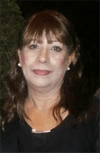Interview with longlisted author Rabia Raihane
16/02/2023

When did you start writing The Family House and where did the inspiration for it come from?
I wrote The Family House during the coronavirus pandemic, during those months of fear and confusion. Everything I had read about epidemics was materializing before me, especially at the beginning: the trucks filled with dead bodies on TV, the rapid, dramatic repercussions, the blunders, the influx of news reports that are then contradicted, the sanitizers, the bleach, the masks, death, the isolation, then the total standstill, the silence. Before that, I don’t know for how long, I was set on what I wanted to write and I was entrenched in the realistic and imaginary elements, waiting for the moment when I would sit and write the first sentence. My memory was a great asset, taking me back, with nostalgia and familiarity, to a defined past that was also strongly present. A past I had lived in reality and continued to live in my head. This allowed me to reproduce the events and experiences with their contradictions: good and evil, intimidation and enticement, loyalty and protection, rebellion and its consequences – attempts to liquidate the rebellious person (the grandfather), authoritarianism and freedom. A socio-political, historical dynamic that constitutes part of both the recent and distant past that I was able to step into after a silence, internalizing its background. I was able to bring an end to my internal struggles about the nature of what I had lived or imagined, finding resolution by exposing it through writing, using the artistic craftsmanship required by the fictional narrative.
Did the novel take a long time to write? And where were you when you finished it?
I wrote The Family House over the course of two years, the duration of the pandemic. And although I hadn’t led a very active social life, nor was I a regular at many cafes, yet being forced to stay at home under the weight of fear was unsettling. Writing made me calmer to a certain extent. And because writing itself is practiced in isolation, the externally imposed isolation didn’t trigger any sensitivity for me except for in the last months. I resisted it at first, remaining positive while I aimed to finish the novel by the end of 2021, while on the other hand, questions about the fate of mankind were burrowing deep within.
Do you have writing rituals?
During the muddled beginnings when I was writing at night, I had some simple rituals, like dressing well, silence, and turning on soft music in the background. Scents also calmed those intimidating beginnings, during those moments of manifestation when I would search for myself.
After I had gained more writing experience and left work, I started to write in the morning, a habit I have kept until today. I work with a clear head from 8 am until around 1 pm. I use black ink and paper to jot down ideas that suddenly occur to me or any edits. Apart from writing on the computer, there is a lot of paper and black ink pens at my side, and I am still keen on the silence and scents and music. Although I am sometimes swept away by listening to my inner self and to the whirlwind of thoughts within me, and by evoking the details of lost places and times and their accompanying circumstances, all these rituals, which appear almost ordinary, are necessary to make me feel at ease and they keep me company as I delve into my worlds.
What is your next literary project after this novel?
For about a year I’ve been working on a new novel, a formula for the need to find a hidden language for equality. The working title is Women of Shade and Abandonment. It may become the actual title.
